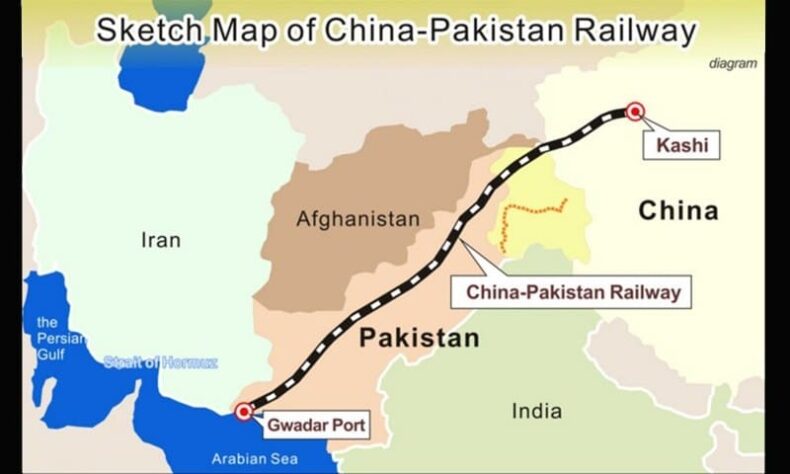The Main Line-1, which Sharif’s administration referred to as “a project of strategic importance,” was agreed to be launched by the two countries, China and Pakistan.

In a meeting in Beijing, Chinese President Xi Jinping and Pakistani Prime Minister Shehbaz Sharif decided to start a $9.85 billion high-speed rail project. This decision comes as the world’s second-largest economy moves to slow some of its lending due to growing concern
The Main Line-1, which Sharif’s administration referred to as “a project of strategic importance,” was agreed to be launched by the two countries. In order to accommodate high-speed trains, that project entails converting a 1,163-mile colonial-era route from Karachi to Peshawar.
The project has been in discussion for years and was officially approved by Pakistan earlier this week, without disclosing the source of finance or offering any technical information.
Pakistani officials earlier stated that they anticipated receiving funds from China for the refurbishment.
Debt Diplomacy
The US has previously chastised China for employing “debt diplomacy” to increase the dependence of poor countries, on Beijing. However, China postponed a rescue for Pakistan earlier this year as its debt ballooned, and it has been reducing funding to Africa, as its economy weakens.
The International Monetary Fund stated in a report in September, that China including state-owned commercial banks, is the recipient of almost 30% of Pakistan’s foreign debt.
In June, Moody’s Investors Service changed Pakistan’s outlook from stable to negative due to financial worries. Sharif had just returned from a two-day trip to Beijing. This week, China is hosting a flurry of international leaders as President Xi begins his third term.
An attempt to fulfill his previous pledge to expand China’s influence throughout the world. Since the Chinese president reshuffled the leadership last month, Nguyen Phu Trong, the head of the Communist Party of Vietnam, was the first foreign leader to meet Xi.
The Tanzanian President, Samia Suluhu Hassan, and German Chancellor, Olaf Scholz will then be anticipated to speak with Xi and his top officials in the capital.
He is set to fly to Indonesia and Thailand, later this month for significant meetings attended by world leaders such as President Joe Biden and Vladimir Putin of Russia.
Joint committee commission
According to a media source on Friday, both countries have decided to move forward with the much-delayed USD 10 billion Karachi to Peshawar train line. It is part of a crucial component of the grandiose CPEC project before Pakistan Prime Minister Shehbaz Sharif’s first trip to China, the following week.
Beginning on November 1, 2022, Prime Minister Sharif will travel to Beijing with a significant group to witness the signing of the Joint Coordination Committee (JCC) meeting minutes.
The meeting between Mr. Sharif and Chinese President Xi Jinping, who last week won an unprecedented third term as the General Secretary of the country’s ruling Communist Party, is anticipated to be a first for a foreign head of state. The News stated that the JCC of the two nations, convened virtually, on Thursday.
It was decided to begin the ML-1 project for the building of the Karachi to Peshawar rail line link. Earlier, it was disregarded despite being considered the backbone of the China-Pakistan Economic Corridor (CPEC).
China-Pakistan Economic Corridor
The CPEC which was established in 2013, focuses on the energy, transport, and industrial cooperation. It runs from Pakistan’s Gwadar port on the Arabian Sea to Kashgar in northwest China’s Xinjiang Uygur Autonomous Region.
The Belt and Road Initiative (BRI), a pet project of President Xi, includes China’s $60 billion CPEC.
Ahsan Iqbal, the Minister of Planning and Development for Pakistan, and Lin Nianxiu, the Vice Chairman of China’s National Development & Reform Commission, served as co-chairs of the meeting.
Both parties also decided at the conference to work together to advance information technology. China will construct new research facilities in Pakistan to investigate potential future opportunities in this field.
Plans ahead
The planning minister, Mr. Iqbal, emphasized three fundamental goals, including the revitalization of CPEC, the inclusion of new projects to expand CPEC’s portfolio, and business-to-business cooperation, which was previously based on government-to-government.
There were not many other agreements reached between the two nations that covered the new topic of “Water Resource Management and Climate Change,” which is crucial in the wake of Pakistan’s devastating floods that caused the devastation of enormous proportions.
The Karachi Circular Railway (KCR), which is another important project that is anticipated to benefit a sizable portion of Karachi’s population, was also extensively discussed. Cash-strapped During Mr. Sharif’s visit, Pakistan would also ask for the rollover of deposits and a restructuring of its debt, according to the publication.
The International Monetary Fund (IMF) estimates that Pakistan’s total non-Paris Club bilateral debt is currently around USD 27 billion, of which USD 23 billion is owed to China. The report stated that the Pakistani government has put forth a number of new proposals.
This includes- post-disaster reconstruction, bolstering digital investment in the economy, global development initiatives, an agreement between the two countries’ geological survey institutions, and collaboration to increase Pakistan’s export potential. Agreements on these proposals are expected to be finalized soon.
Read More: Delhi Police’s raids on The Wire editors’ homes draw criticism












